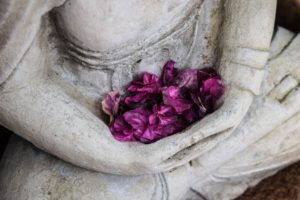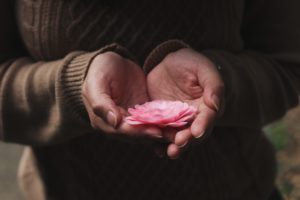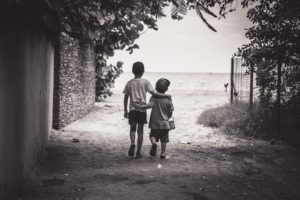by Jenny Rose | Mar 28, 2019 | A Flourishing Woman, Self-Love
As I sit in my attic space this afternoon, the wind roars in the bare trees. Last night it rained. This morning on the way to our weekly breakfast date at a neighborhood diner there were snowflakes in the air as we navigated the crumpled, buckling, pot-holed roads.

Photo by Ludde Lorentz on Unsplash
I’m still listening to David Whyte, and he’s still inspiring me. Listening to him speak is similar to reading his poetry. Each repetition unfolds new layers and depths in my heart and mind.
Today I’ve been reading, sorting, paying bills, and taking care of the oddments we all accumulate on our work surfaces and in our technological tools while we’re out in the world working or doing other things.
Outside the wind rocks the trees, which are just beginning to swell with buds, and David Whyte talks to me of friendship with life, with others and with ourselves. He suggests healthy relationships are a continuous contest of necessary generosity in which we develop a discipline of forgiveness and allowing others to forgive us.

Photo by Ivan Jevtic on Unsplash
I think of forgiveness as a blessing.
It occurs to me the more I forgive myself, the less I need the forgiveness of others. If I love my choices and decisions, I don’t need anyone else to do so.
Do we need forgiveness for who we are? Sometimes we need forgiveness for the boneheaded choices we make, but do we need forgiveness for who we are?
It seems to me the only reasonable answer is no, yet I’ve spent my life apologizing (and in latter years trying not to apologize) for who I am, what I need, and what works and doesn’t work for me in my life.
I have a friend who frequently apologizes for the way she expresses herself and interacts. I understand. We have that self-judgement in common. When she apologizes anxiously for something she said or wrote, or didn’t say or write, I smile to myself. It sounds like she’s apologizing for who she is, but I love her because she is who she is. I have more space for her than she does for herself.

Photo by Jenelle Ball on Unsplash
She has more space for me than I do for myself as well. I hope, with time, our friendship will help us both be less critical of ourselves.
I’m great at giving other people space to be who they are. It’s always been one of my strengths in relationship.
I’m so good at it, in fact, several people with whom I’ve been closely connected quickly took it for granted I would accommodate whatever they needed and/or wanted. Rather than a contest of generosity, such a relationship becomes an endless exercise in trying to please (on my part) and demand (on the part of the other).
The bad news is the only way I can see out of this loop is to learn to say no and enforce boundaries, two things guaranteed to send any person who expects to control my behavior and choices into meltdown.
I hate scenes.

Photo by Cristian Newman on Unsplash
Naturally, my history of allowing others to take control in any given situation positioned me to attract into my life people who insisted their own needs and desires trumped mine. They had no interest in the thoughts and feelings behind the choices I made and did everything they could to manipulate my compliance with their expectations.
The wind blows because that’s its nature. Does it ask forgiveness from the trees? As I gaze out the window, looking for nothing and trying to see everything, I glimpse the possibility of living in such a way that I give myself the space I’ve always given others. Wind blows. Water flows. Mice nibble holes in cushions. Woodchucks dig up the Echinacea roots and eat them. None of it is personal. All act according to their nature, and there’s a kind of inexorable beauty about that.
I want to be beautiful like that.
Yet I have often sought to limit and even hurt myself. The twin disciplines of self-forgiveness and giving myself space have been exceedingly difficult to undertake and maintain, especially in the context of relationships with loved ones. My generosity has been for others, not for myself.
When people come into our lives and force us to make a choice between their expectations and our needs, they’re playing to win at any price, and the only way for them to win is for us to lose.
Not a contest of generosity, but a competition for power.
I have no interest in playing power games, and even less interest in “winning,” particularly if it means someone else has to lose. I’ve never been competitive. On the other hand, I’m finally committed to extending generosity to myself, and I love the gentle persistence in David Whyte’s language: “a continuous contest of generosity.”
Can I enjoy my own thoughts, feelings and expressions as generously as I enjoy the boisterous spring wind, or my friend? Can I honor myself even when people around me tell me I’m bad and wrong? I fought as hard as I could to protect my children and give them a good start. Now, can I surround myself with that same fierce loyalty and generous love? Will I?
Yes.

Photo by Annie Spratt on Unsplash
by Jenny Rose | Mar 21, 2019 | Emotional Intelligence
Once I lived with an avid outdoorsman who fished and hunted. He frequently spent his weekends camping during spring, summer and fall. I knew how much pleasure he took in this time away from the rest of his life, and always saw him off with some variation of “Have a great time.”
It never failed to make him mad.
He said it “put pressure” on him when people wished him well.
I felt both dumbfounded and amused by his attitude. I couldn’t imagine feeling insulted because someone who loves you wishes you a great time.
I’ve been remembering that man this week because I’ve been thinking about giving and receiving blessings.

Photo by Chris Ensey on Unsplash
Traditionally a blessing was an important social exchange. If one was lucky enough to meet an incognito god or goddess on the flanks of Mount Olympus or in some other lonely place and received their blessing, they were broken open to receive it fully, their deepest and most private hopes, fears and pain exposed. It took courage, strength and humility to receive such a gift.
The poet David Whyte suggests we must make ourselves large for the exchange of blessings. To give such a favor is an act of generosity. To receive it is an act of growth. In the last several days I’ve thought a lot about making oneself big enough for blessings. I’ve remembered specific words and ways in which I’ve blessed others, including the simple blessing of my love.
Sometimes I’ve felt the love I gave another in words and actions was recognized, appreciated and fully received. Other times I have not, and I’ve always made that about me. My love was unwelcome and had no value. Now I wonder, though. Perhaps it wasn’t me at all. Perhaps they were not big enough in that moment to accept my blessing.
That thought leads me inexorably to wondering how many times I have not been big enough to receive a blessing from someone else. I’m forced to admit there have been plenty of times; probably many more than I’m aware of.
Am I big enough to be loved hugely, or receive a large sum of money or have my creative hopes realized?

Photo by Joshua Earle on Unsplash
I’m not sure I am. I’m big enough to be loved moderately, but hugely? No, that feels like too much. I can feel myself tensing, rounding, drawing my knees up and wrapping my arms around my body as I imagine someone trying to give me huge love. I’m not worth that. I’ll be sure to disappoint. They’ve mistaken me for someone else.
I’m too small for such abundance. I choose to be too small. I’m afraid to stand up straight, open my arms and heart wide, and accept huge love. I choose to limit what comes in. I’m afraid of the pain of being broken open. I can make myself bigger in spite of my fear, but I usually don’t in order to accommodate a blessing.
Therefore, I impoverish myself. I have people around me who love me. Perhaps they love me as deeply as I love, and they long for me to receive it as I long for my love to be received, but my own inability to be large enough to allow their blessing into my life makes the energy of their love impotent and weakens our connection. My fear and choice to be small, hard and rigid, like a rolled-up porcupine, not only limit me; they limit others as well.
My most frequent prayer on behalf of others is that they might experience the greatest good. I use that specific language because I know I don’t know what the greatest good is for any of us. Sometimes what we want the most in life is not in our best interests. Sometimes the hardest experiences are the most useful to us. Sometimes what we long for is what we most need. I don’t know. I’m not big enough to know. I can’t see far enough down the road to judge the value in any experience. All I can say, along with everyone else, is what feels pleasant and what feels uncomfortable to me in the moment.
Oxford online dictionary defines blessing as “a beneficial thing for which one is grateful; something that brings well-being; a person’s sanction or support.” We all can make a list of crises in our lives that later turned out to be blessings in disguise. Maybe it’s all a blessing – each breath, each heartbeat, each tear, each drop of blood and sweat, each moment, each life and death. Gratitude is a practice encompassing all our experience.

Photo by Ester Marie Doysabas on Unsplash
To receive a blessing is to allow an expression of support, affection and maybe even love touch us. It’s an act of trust in the intention of the one who blesses us, as well as faith in our own worth. We need one another in this life, and healthy reciprocity makes connections stronger. It’s not enough to be the strong one who maintains safety by extending love and support while accepting none; we must also be willing to be down and out, to be lost and confused, and to receive help and encouragement in our turn.
Last weekend two friends and my partner helped me empty out my flooded storage unit, chip ice, sweep water, put down pallets (transported in my friends’ truck), and put everything back again. We were ankle-deep in mud, slipped and slid on ice and splashed around in water as we worked. It needed to be done and I wanted to do it. I know I needed help. Yet from the beginning I was blocking the support and caring around me. I fussed about my friends using their Saturday to undertake such a messy job. I felt bad about using their truck. I was worried somebody would hurt their back heaving my wet mattress and box springs around. At the same time, I was deeply touched and uncomfortable because I could feel their caring and concern and I didn’t know how to take it gracefully. I wanted to be big enough to accept friendship and love from these dear ones, but it was really hard. I know, however, I’m not good at receiving and I want to be better. I also know, had our positions been reversed, I would have greatly enjoyed helping out a friend on a windy spring Saturday morning.
I endured my discomfort. Now that it’s done, what I will remember is not what was damaged and lost, or even the mess. What I’ll remember is the four of us tackled a necessary job, worked together and had a good time doing it.

Photo by Juan Pablo Rodriguez on Unsplash
It was a blessing. I stretched as wide as I could to receive it.
I need more practice.
When I tell someone I love them, or wish them a great day, or the greatest good, I mean it. It’s not just words. My heart is in it. When I light a candle and reach out with all I am to a loved one who is far away, I’m offering the best I am as a blessing, a candle in dark times, a comfort in distress. I want the gift of my love and support to be received and used.
Probably the best place to start is to learn to receive with more grace myself, to expand, and to humbly accept whatever blessings come my way, whether plainly visible or in disguise.
Have a great day, readers. Greatest good to you. Blessings.

Photo by Stephen Leonardi on Unsplash
All content on this site ©2019
Jennifer Rose
except where otherwise noted
by Jenny Rose | Mar 7, 2019 | A Flourishing Woman, Creativity
Lately I’ve been thinking about how much living a life resembles writing a story.

Photo by Josh Applegate on Unsplash
We love our stories, whether they be in the form of songs, film, books (digital or tangible) or spoken language. We love the nonfiction of history and science, memoirs, and fiction. Story has anchored me to life since before I learned to read.
During my writing hours I’m engrossed in creating characters and weaving them together. One scene gives rise to another. There must be action and movement. There must be some kind of story logic. Every word must help drive the story forward. Characters need to be believable and recognizable in their behavior and growth. As an audience, we want to see characters change and learn. We want to commiserate with and applaud our favorite characters. We want them to do well.

Photo by Igor Ovsyannykov on Unsplash
As a writer, I don’t have total control or knowledge of my story. I create a rough outline, create characters, choose a setting, and start writing. If I’ve done well with my characters, the act of writing animates them into becoming collaborators rather than pawns. I’ve learned the characters who remain passive and one-dimensional are weak and need to be reworked. I may have a direction I want my characters to go in, but strong ones frequently refuse to comply with my outline and notes and we wind up sitting glaring at one another with our arms folded, my character looking out from the laptop screen at me at the keyboard. The flow of the writing stops then, until I set aside my rigidity and work with other possibilities.
This is exactly like life. How often have we gone down a blind alley and wound up with our noses against a brick wall but been too stubborn or exhausted or despairing to retrace our steps and choose another direction? How often have we taken a well-worn path of anxiety and wound up in a trackless desert or marsh, floundering, miserable and lost?

Photo by Joshua Earle on Unsplash
As we journey through the story of our own lives, however, our view is from the bottom of the valley rather than from a high mountain from which we can see the whole thing. We live our stories one moment at a time, losing sight of the beginning and never knowing the end until we reach it. Our lives are filled with things like visits to the bathroom, brushing our teeth, lost car keys, bills, errands, flat tires and dead car batteries, and colds.
But these details, so ubiquitous in what we call “real life” add nothing to a great film or book. They’re not sexy and entertaining. Nobody wants to watch Wonder Woman floss her teeth or cut her toenails. We don’t see our favorite heroes spending hours hunched over their phones, tablets and games.
We can’t tell the sweeping story of our lives while we’re living them. We know when things feel good or bad, but we don’t look beyond that most of the time. We’re more concerned with our discomfort and disappointment than we are with the inherent ebb and flow of life.
We don’t think about what our story requires. We don’t see our most difficult times as turning points essential to our story.

Photo by Andrew Spencer on Unsplash
As a writer, however, I know tension, conflict and obstacles are necessary. They create movement and growth. They create change. They force characters to reveal weaknesses and summon strengths. They teach resilience and test faith.
What would it be like if we could watch our own lives as though watching the next big superhero movie? What if we could revel in the setting we find ourselves in, even if we decide to escape it and find a new one? What if we chose to feel inspired by the unpredictability of our unfolding lives and heartened by the way obstacles shape us?
What if every experience was an essential, beautiful part of our story?
What if . . . ?
All content on this site ©2019
Jennifer Rose
except where otherwise noted












